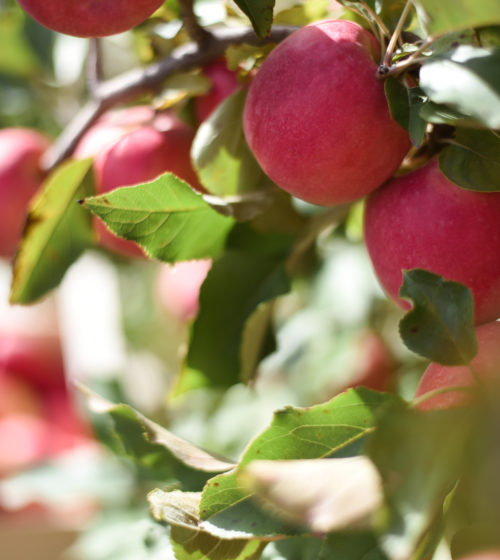
Questions?
What makes a Pink Lady® apple a Pink Lady® apple? How long do they take to grow? Where do they come from? You’ll find the answers to our most frequently asked questions below.
Only the pick of the crop meet the Pink Lady® standard. Those varieties include Cripps Pink, Rosy Glow and Lady in Red.
Crisp, sweet and delicious with a wonderful fizz.
Our Pink Lady® apples have an unmistakable rosy blush, from the Cripps Pink heritage.
Pink Lady® apples average between 65-80mm diameter and on average weigh 133g, but we also do smaller PinKids® apples.
Our orchards can be found across the world in France, Italy, Spain, Chile, Argentina, South Africa, Australia and New Zealand, just like the finest wine regions.
The apples that don’t get to wear a Pink Lady® sticker don’t go to waste, they are used for lots of different things including our delicious Pink Lady® apple juice.
7 months. That’s 200 days of sunshine!
A typical Pink Lady® apple contains 70kcal.
At the moment, our packaging is in compliance with current food contact regulations and although part-recycled, we are working towards reducing the environmental impact of our packaging in the long-term.
We're sorry to hear you are unhappy with your apple/apples. Please DM the retailer in which you purchased the apples from with details of where you bought it/them and your contact information. Otherwise, you can DM us and we will be in touch. We will address any complaints or queries accordingly
Pink Lady® apples are obligated to meet all food regulations and testing standards of the country in which they are sold. These include local standards around chemical residues.
A maximum residue level (MRL) is the highest level of chemical residue that is legally permitted and while MRLs can vary by region, the levels set are well below that which could cause harm to ensure safe consumption.
The European Commission fixes MRLs for all food and animal feed and maintains a MRL database on the Commission website.
In addition to regulatory requirements, all Pink Lady growers and pack houses must meet an approved food safety certification, such as Global Gap, in order to pack Pink Lady® apples. This includes the requirement to test for residues.
If an apple fails to measure up to the global Pink Lady® specification – including food safety certification - that apple cannot be branded as a Pink Lady®.
We always recommend washing apples before consumption as a matter of general hygiene, and we also strongly recommend eating apples with the skin on as it is the most nutritious part of the fruit.